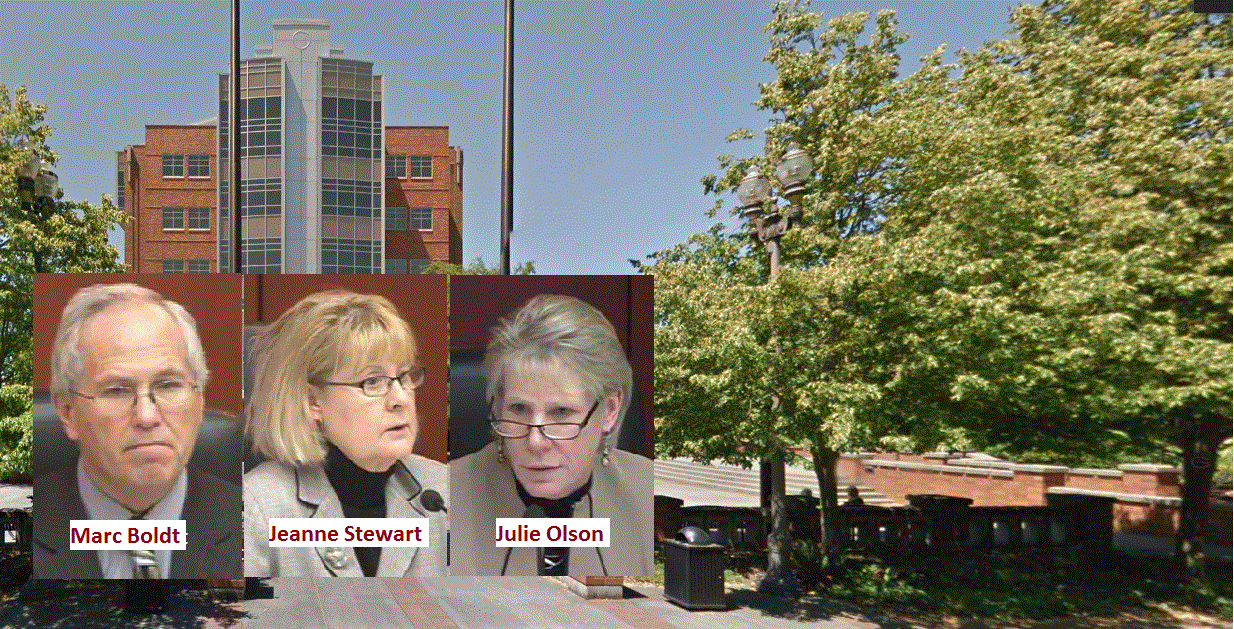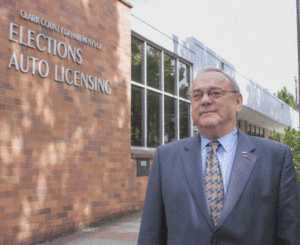
Clark County Councilor Tom Mielke has filed a statement of charges as the basis for the recall of Councilors Marc Boldt, Julie Olson, and Jeanne Stewart with the Clark County Auditor’s office. This is the opening salvo of a recall effort aimed at ousting the three councilors that have kept the ClarkCounty.info team busy writing about their serial lawlessness.

Under the provisions of RCW 29A.56, any voter in the jurisdiction of an elected official may demand a recall by submitting a typewritten charge naming the elected official and detailing acts of malfeasance, misfeasance or violations of the oath of office. This letter is to be filed with the election officer, in Clark County that would be Greg Kimsey – who begins the procedures outlined in the RCW to implement the recall.
Councilor Mielke’s letter details four acts of misfeasance, malfeasance and violations of these councilor’s oath of office.
- During reviews of the County’s comprehensive Plan, Councilor Madore was concerned about the accuracy of testimony made by members of the county planning department. Because of his persistence in highlighting the allegations against the planning department, Mielke’s letter alleges that County employees retaliated by filing specious whistleblower and discrimination complaints against Madore. Because of this, Madore is alleged to have requested an independent investigator to examine his allegations and see if they had any legal merit. The County manager contracted an independent investigator to audit the conduct of Councilor Madore, not the planning department. According to Mielke’s letter, the county manager has no such authority to contract with an investigator on his own, and the decision to investigate a sitting councilor was made by a three-person majority of the council, without consulting the full council body, in a private session, which violates the state’s open and public meetings act (OPMA). Mielke details the sequence of events that led to this decision in some detail, and concludes that the chairman knowingly violated the Open and Public Meetings act to initiate what amounted to a public witch hunt and defamation campaign against a political rival.
- Mielke charges that Councilors Boldt, Olson, and Stewart illegally orchestrated a decision to award the paper of record contract to a newspaper that had a lower circulation and higher cost than the competing bid. The statement charges these councilors did this as a quid pro quo for that paper’s editorial campaign that attacks the councilor’s political rival and supports Councilors Boldt, Olson and Stewart with favorable press. Mielke cites numerous specific instances of aggressively biased journalism by the Columbian to support his charge.
- Mielke cites the adoption of a rule of procedure by Councilors Boldt, Olson and Stewart that prevents any councilor from soliciting legal opinions from the County Prosecuting Attorney unless first approved by the County Manager, Council Chair or majority of the Board. This rule effectively forms a barrier that prevents minority Councilors from seeking legal opinions of the Prosecuting Attorney, a clear violation of RCW 36.27.020(2). One has to wonder if the Board majority sought the legal opinion of the prosecuting attorney before passing this rule.
- Mielke charges that Boldt, Olson, and Stewart either abdicated their budgetary responsibility under the County Charter and RCW 36.40 or colluded in secret in violation of the OPMA when Manager McCauley dissolved the Department of Environmental Services (DES). Mielke makes the case that the reorganization of the DES was done by the County Manager in retaliation for Director Don Benton’s filing of a whistle-blower complaint. This complaint alleged that McCauley directed Benton to prepare reports that contradicted the County Commissioners actions taken before the current council was seated, stopped the process of putting a parcel into surplus as previously authorized, and that Benton and his staff had been disciplined for their support of Councilor Madore. Twelve days after the whistle-blower complaint was filed, Benton and key members of his staff who supported Madore were fired without warning, and the responsibilities for the DES were absorbed into other departments, though the department had been fully funded in the budget for the entire year. This opens the County to a lawsuit, as an excellent case could be made that the firing was done in retaliation for the whistle-blower complaint and other political retribution. Mielke charges that the Board of County Councilors had no meetings regarding the reorganization of the DES, and that Chairman Boldt either did not forestall McCauley’s actions, thereby abdicating his fiduciary responsibility, or secretly approved the action, in clear violation of the Open and Public Meetings law.

This statement of charges to support a recall does not necessarily preclude civil or criminal action that may be taken against the County or the County Chairman concerning these allegations.
The next steps required by law are that the County Auditor will serve a copy of these charges against Councilors Boldt, Olson, and Stewart. He will then certify and send the charges to the County Prosecuting Attorney, who will formulate a ballot synopsis of not more than two hundred words. The Prosecutor will send the ballot synopsis to the County Superior Court, which will be charged to approve the synopsis and determine the sufficiency of the charges. A hearing date will be made for these councilors and Mielke to address the sufficiency of the charges. All parties may appear with legal counsel at the hearing. The court may correct the ballot synopsis if it considers it inadequate, and will send the synopsis back to the County Auditor. The Court’s decision about the sufficiency of the charges is subject to appeal by Boldt, Olson, or Stewart. Once the Synopsis has been declared acceptable and the appeals process is complete, the recall effort will have one hundred and eighty days to gather signatures to support a recall. The number of signatures must be 25% of the total votes cast for the position in question in the previous election – in Boldt’s case, 20,540 signatures will be required.

The RCW is clear and rigid about the process to be followed. It requires specific actions to be carried out by County officials and sets time limits for each action. We’ve already discussed Greg Kimsey’s lack of objectivity in matters such as this, but by the RCW he has little leeway. Prosecutor Tony Golik can have a profound impact on this petition in the drafting of the synopsis. Notwithstanding his partisan history, we expect he will avoid overtly sabotaging the charges, given that he’s subject to judicial oversight in the review process. We can expect the players to drag their heels and run the clock as much as possible, but that strategy has advantages for both sides of the question. We at ClarkCounty.info are educating our readers about the process because we believe an informed public is better able to keep a watchful eye on our elected officials and highlight any shenanigans before they start.
We fully expect the establishment and leftists – those infected with Madore Derangement Syndrome – to lose their collective minds about this recall effort. Lou Brancaccio and the Columbian will devote a huge amount of ink to put their particular spin on events and disparage the effort with distortions, omissions, specious charges and outright lies. It’s up to the citizens to use the public record freely available on The Grid to verify the validity of Mielke’s allegations against Brancaccio’s claims. It’s incumbent on the citizen to do their due diligence and not be swayed by the loudest voice. Like John Adams observed, “Facts are stubborn things.”
